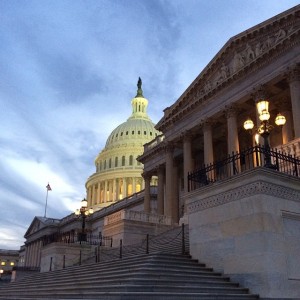On the Hill: AHA Hosts Series of Congressional Briefings on Blasphemy Laws
The American Humanist Association, working with our allies at the Center for Inquiry and the Secular Coalition for America, held a series of briefings in the US House and Senate over the past two weeks to discuss international religious freedom and threats to that fundamental human right. These briefings follow the recent AHA-led introduction of bipartisan resolutions in the House and Senate, H. Res. 349 and S. Res. 647, which oppose blasphemy laws and promote religious freedom.
These briefings featured a wide range of speakers from government, the faith community, the nontheistic community, and the secular community, including: Representative Jamie Raskin (D-MD); Knox Thames, US State Department special advisor for religious minorities in the Near East and South/Central Asia; Elizabeth K. Cassidy, director of international law and policy for the United States Commission on International Religious Freedom; Amjad Mahmood Khan, Esq., national director of public affairs for Ahmadiyya Muslim Community USA; Jennifer Hawks, associate general counsel for the Baptist Joint Committee for Religious Liberty; Robyn Blumner, president and CEO of the Center for Inquiry; Matthew Bulger, legislative director at the American Humanist Association; Matias Perttula, advocacy director for International Christian Concern; Sarah Haider, executive director of Ex-Muslims of North America; and Jay Kansara, government affairs director for the Hindu American Foundation.
These briefings demonstrated the interfaith nature of the effort to oppose blasphemy laws, as representatives from the Muslim, Christian, Hindu, humanist, and atheist communities all spoke as to why the people they represent oppose these harsh laws.
While many of the speakers addressed the personal suffering of those living under blasphemy laws, I chose to review what exactly these resolutions, H. Res. 349 and S. Res. 647, would do if passed by Congress. These resolutions emphasize several important actions, including:
- Calling on the president and the Department of State to make the repeal of blasphemy, heresy, or apostasy laws a priority in the bilateral relationships of the United States with all countries that have such laws; and designate countries that enforce such laws as “countries of particular concern for religious freedom” under the International Religious Freedom Act of 1998.
- The resolutions also urge the governments of countries that enforce such laws to amend or repeal such laws and have prosecuted, imprisoned, and persecuted people on charges of blasphemy, heresy, or apostasy to release such people unconditionally and ensure their safety.
- Finally, the resolutions encourage the president and the State Department to oppose any efforts by international or multilateral forums to create an international anti-blasphemy norm, and any attempts to expand the international norm on incitement to include blasphemy or defamation of religions.
Beyond the details of the resolutions connected to this briefing and the stories of those suffering under blasphemy laws, the speakers continuously emphasized that blasphemy laws are truly a global interfaith problem. A Pew Research study found that a quarter of the world’s nations maintain blasphemy laws. This type of legislation exists in places like Russia, Brazil, Ireland, Canada, Egypt, Greece, Saudi Arabia, Bangladesh, Pakistan, and Indonesia, and such laws are not merely the problem of one particular religious or nontheistic community.
As humanists we firmly believe that the religious beliefs of our fellow human beings deserve to be respected, just as any sincerely held belief should be respected. True religious freedom requires the ability to disagree with religious beliefs, and to publicly state that disagreement without fear of governmental oppression or societal violence. Hopefully, holding these congressional briefings and promoting these importation resolutions will help bring about a global society in which freedom of speech and freedom of and from religion are not just noble aspirations.

